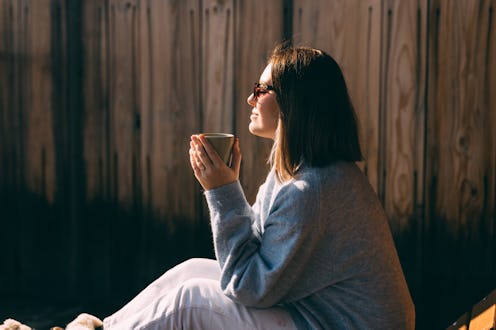Life
How Sunglasses Can Get You A Better Night's Sleep

I tend to associate wearing sunglasses at night with celebrities who think they are too school for school (or, you know, the normal light levels experienced by us plebeians), but could they be on the right track after all? One sleep expert suggests that wearing sunglasses at night might actually help you sleep better. So go ahead and channel your favorite ’80s rock star and wear shades with your pajamas.
Sleep expert and sunglasses aficionado Glenn Landry is a postdoctoral research fellow at the University of British Columbia’s Aging, Mobility, and Cognitive Neuroscience Lab. He thinks that wearing sunglasses before going to bed might help to regulate the body’s circadian rhythms. Circadian rhythms are essentially the body’s clock, telling you when to be asleep and when to be awake.
These rhythms are deeply affected by light exposure. In general, the human body is programmed to be sleepy when it’s dark and wakeful when it’s light, which is all well and good when your main light source is the sun. But when you bring in artificial light at night— especially the blue light emitted by cell phones, tablets, and televisions — it can make your circadian rhythms go out of whack, resulting in problems with falling and staying asleep.
But if artificial light can mess with circadian rhythms, might artificial darkness help to put them back in order? Landry thinks so, and his solution is simple: Sunglasses. “Beginning at eight at night, two hours before [the] time I want to go to bed, I wear sunglasses,” he told CBC News. “Not because my future's so bright, but because I’m trying to avoid light. I’m trying to tell my clock that this is the end of the day.”
I’m pretty sure that Corey Hart has some essential scientific commentary on this matter. Ahem:
The importance of getting sufficient, good-quality sleep isn’t only a matter of feeling bright-eyed and bushy-tailed when you get up in the morning. Sleep — and the lack of it — have major effects on long-term health. For example, Landry and Teresa Liu-Ambrose, the Canada Research Chair in Physical Activity, Mobility, and Cognitive Neuroscience at UBC, are studying how to improve sleep for seniors, who are particularly susceptible to disruptions in their circadian rhythms. Research has shown a connection between dementia and insufficient sleep in the elderly, so Landry and Liu-Ambrose are working on ways to improve sleep for the elderly and, hopefully, their cognitive health. “Sleep has a lot of potential for preserving brain health across the lifespan,” Liu-Ambrose told CBC News. “Slowly, but surely, we’re all recognizing it.”
So the next time you need some help winding down? Do your best impression of a pop star and don some sweet nighttime shades.You might feel ridiculous, but if it helps you sleep, who cares?